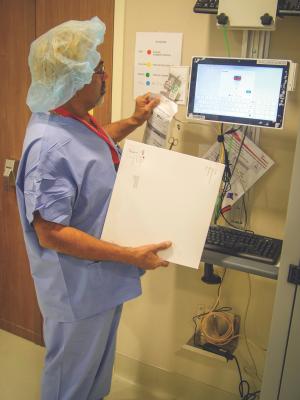
October 15, 2018 — The nation’s two leading cardiac accreditation and certification organizations are joining forces to offer a single joint product for hospitals beginning Jan. 1, 2019. The American Heart Association and The Joint Commission, the largest standards-setting and accrediting body in healthcare, are collaborating to enhance cardiovascular patient care and improve outcomes and quality of life for patients with cardiovascular disease.
The certification program combines the AHA’s Cardiovascular Center of Excellence accreditation and its expertise in cardiovascular science, research and quality improvement, with The Joint Commission’s existing Comprehensive Cardiac Center Certification and expertise in working with healthcare organizations to evaluate care delivery that meets rigorous evidence-based standards and sustain improvements in patient care quality and outcomes. This joint cardiac certification award will be granted to hospitals that achieve rigorous standards of care. Hospitals will be required to deliver integrated, coordinated and patient-centered cardiac care and communications, from the emergency department visit to diagnosis, treatment and follow-up, and through outpatient care.
“American Heart Association and Joint Commission certification ensures that a hospital’s treatment practices and procedures meet the highest standards of cardiovascular care based on proven treatment guidelines,” commented Gregg C. Fonarow, M.D., FACC, FAHA, FHFSA, longtime American Heart Association volunteer and quality improvement leader and director of the Ahmanson-UCLA Cardiomyopathy Center at the David Geffen School of Medicine at UCLA. “Patients’ confidence and trust in their healthcare facilities increase when they know it has received approval from these two leading organizations.”
“The Joint Commission’s ongoing collaboration with the American Heart Association through Primary Stroke Center Certification, Comprehensive Stroke Center Certification, Acute Stroke Ready Certification, Thrombectomy-capable Stroke Center Certification, Advanced Certification for Heart Failure and now Comprehensive Cardiac Center Certification consolidates and strengthens certification options for our nation’s hospitals,” said Patrick Phelan, MBA, executive director, Hospital Business Development, The Joint Commission.
“Most importantly, together, we are ensuring the highest levels of support and expertise for our nation’s hospitals, working every day to most quickly and effectively translate the latest evidence-based science to the bedside — to save more lives and improve cardiovascular patients’ quality of life.”
Organizations currently certified or accredited under current Joint Commission or American Heart Association cardiac programs will automatically transition to the new combined certification. These organizations will undergo re-certification review at the end of their current certification cycle. Organizations seeking certification for the first time will undergo review under the new Joint Commission/American Heart Association Comprehensive Cardiac Center Certification criteria.
In the process of merging the two programs, The Joint Commission and the AHA reviewed both organization’s program requirements alongside the latest standards of practice, scientific guidelines and literature to identify opportunities to revise and strengthen standards in the areas of:
- A collaborative model of care through effective comprehensive cardiac center management;
- Continuous quality and systems improvement; and
- Population health needs, including community education.
The Joint Commission and American Heart Association advanced certification program will maintain rigorous standards for:
- Management of ischemic heart disease, acute myocardial infarction, percutaneous coronary interventions, coronary bypass graft surgery, cardiac valve disease, dysrhythmias, heart failure and cardiac arrest;
- Cardiac rehabilitation of patients either onsite or by referral;
- Standardized communication channels for patient transfers;
- Properly trained staff to treat and care for individuals with cardiac disease;
- Cardiovascular risk factor identification and cardiac disease prevention;
- A minimum of 10 patients at the comprehensive cardiac center during the time of the onsite review; and
- Use of Get With The Guidelines or a national quality improvement registry or similar data collection tool to monitor data and measure outcomes for specified conditions and procedures.
Pre-publication revisions to the Comprehensive Cardiac Center Certification standards, which become effective Jan. 1, 2019, are available here.
For more information: www.jointcommission.org, www.heart.org


 November 14, 2025
November 14, 2025 









